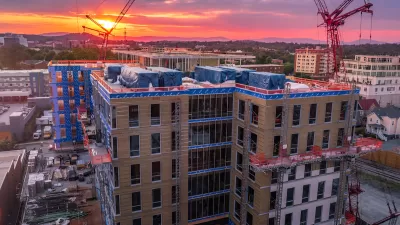Despite new construction, Miami homes remain stubbornly expensive. An opinion piece for Next City makes the case for community land trusts as a solution.

Miami has built a number of impressive skyscrapers, but the changing skyline and growing capacity has not translated into a lot of affordable housing. "According to data from the Florida International University Metropolitan Center’s Miami-Dade Prosperity Initiative study, 61 percent of Miami-Dade County renters and 42 percent of homeowners are paying more than 30 percent of their income on housing – making this one of the most unaffordable housing markets in the United States," writes Mandy Bartle. Miami's property market has a number of buyers from within and without the city limits. "Every year, we lose homes that were once affordable to working-class families as they are redeveloped as luxury homes or simply consumed by the surrounding market," Bartle contends.
Bartle's opinion piece argues that nonprofits and government agencies need to make sure they own land so that they can keep it affordable in perpetuity: "The community land trust model preserves permanent affordability by separating the ownership of land from the home that sits on it; the community retains ownership of the land, and homes are sold (or at times rented) to individuals at an affordable price."
FULL STORY: What Miami’s Skyline Could Mean for All of Miami’s Residents

Maui's Vacation Rental Debate Turns Ugly
Verbal attacks, misinformation campaigns and fistfights plague a high-stakes debate to convert thousands of vacation rentals into long-term housing.

Planetizen Federal Action Tracker
A weekly monitor of how Trump’s orders and actions are impacting planners and planning in America.

Chicago’s Ghost Rails
Just beneath the surface of the modern city lie the remnants of its expansive early 20th-century streetcar system.

Bend, Oregon Zoning Reforms Prioritize Small-Scale Housing
The city altered its zoning code to allow multi-family housing and eliminated parking mandates citywide.

Amtrak Cutting Jobs, Funding to High-Speed Rail
The agency plans to cut 10 percent of its workforce and has confirmed it will not fund new high-speed rail projects.

LA Denies Basic Services to Unhoused Residents
The city has repeatedly failed to respond to requests for trash pickup at encampment sites, and eliminated a program that provided mobile showers and toilets.
Urban Design for Planners 1: Software Tools
This six-course series explores essential urban design concepts using open source software and equips planners with the tools they need to participate fully in the urban design process.
Planning for Universal Design
Learn the tools for implementing Universal Design in planning regulations.
planning NEXT
Appalachian Highlands Housing Partners
Mpact (founded as Rail~Volution)
City of Camden Redevelopment Agency
City of Astoria
City of Portland
City of Laramie





























